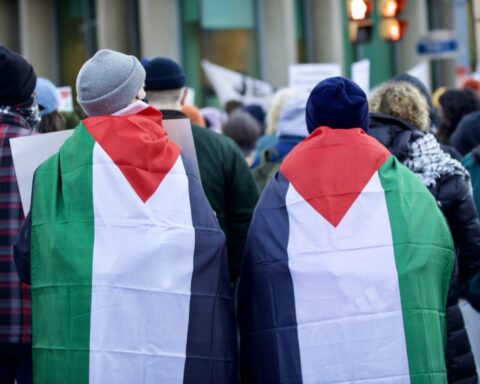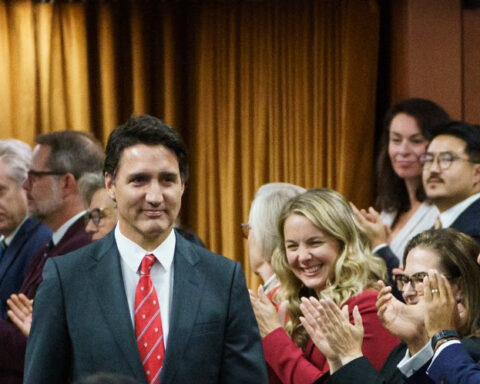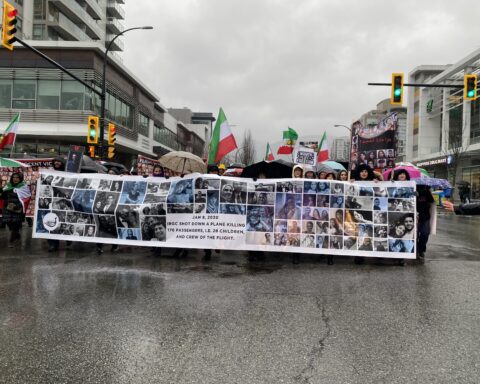In politics as in life, you always meet the devil on a curve.
For Justin Trudeau, mass murder in Paris is his trial by ordeal as prime minister. It didn’t take very long. At the end of the month, Paris was supposed to be the glittering venue where a new, young prime minister, and an impressive delegation, would announce to the world that the old Canada is back. No more fossil awards, no more climate change denial on behalf of oil companies or the Koch Brothers, no more corporate-driven “facts” on the environment, no more beating the war drums. Canada was not shaking its finger at the world anymore, but offering an embrace.
It was the Canada the world knew — collegial and multilateral, not bullying and unilateral. Or at least that was the script until the City of Lights became a charnel house.
Changing script
Events in Paris threaten to turn the Trudeau debut and the climate change summit into a sub-plot. One of the reasons behind Trudeau’s landslide victory on last month was his promise to withdraw from the bombing of ISIS in Iraq and Syria while still remaining in the U.S. led coalition but in a different role.
One of the first things Trudeau did after winning the election was to inform U.S. President Barack Obama of his decision to get out of the bombing business. Judging by the polls, Canadians approved. A whopping 75 per cent said that they were happy with the outcome of the election — though no specific question was asked about bringing back the jets.
In place of the bombs, Trudeau offered three other ways Canada could contribute to the coalition effort: take in 25,000 Syrian refugees by year’s end; increase humanitarian aid to those displaced by the bitter civil war; and to train Kurds in Northern Iraq so that they could defeat the terrorists who have annexed other peoples’ lands to create their self-declared caliphate.
With 129 dead in Paris, the French president cancelling his trip to the G-20 summit in Turkey, and the far right French leader Marine Le Pen demanding the “annihilation” of ISIS, Trudeau will be under tremendous pressure to reverse his decision to bring home the F-18s.
[T]he prime minister’s pledge to re-settle 25,000 Syrian refugees by year’s end will soon be portrayed as a dangerous and irresponsible opening of Canada’s borders.
Doubtless, there will also be a concerted push for his new government to leave more of the police-state legislation, C-51, in place.
Finally, the prime minister’s pledge to re-settle 25,000 Syrian refugees by year’s end will soon be portrayed as a dangerous and irresponsible opening of Canada’s borders, particularly if it can be confirmed that one of the Paris attackers was a refugee who held a Syrian passport.
I note that Godfrey’s Zombies over at the Post are already playing the stale Islamophobia card left over from the Harper years by suggesting that the horror of Paris calls into question a lot of his new direction in foreign policy and national security. It’s all designed to make Trudeau’s knees jerk.
Scrutiny expected of new defence minister
In the wake of Paris, the Conservatives also have another potent attack line into the Trudeau government when parliament reconvenes on December 3 — Canada’s “Badass” new minister of defence, Harjit Sajjan.
Just two days before the Paris attacks, Sajjan was widely quoted as saying Canadians needn’t fear ISIS. The entire quote, which included “ISIS is a threat, no doubt about that. Should we fear it? No. The Canadian population should have full confidence in all the security services to keep us safe,” will not likely get wide citation. Don’t expect to see those nuances repeated by the likes of Rona Ambrose or Jason Kenney when they rise to ask questions on their first day as the official opposition.
Nor is Sajjan’s vulnerability limited to his poorly timed, but nonetheless true, declaration about ISIS. Sajjan’s military past, filled with honours and awards for courage and ingenuity, also has a potential dark side.
Sajjan might find himself in an untenable position if the Trudeau government decides to call an inquiry into an old ghost of the Harper years — the Afghan Detainee scandal.
According to a new piece written for NOW Magazine, Sajjan might find himself in an untenable position if the Trudeau government decides to call an inquiry into an old ghost of the Harper years — the Afghan Detainee scandal.
Why are the folks over at the Rideau Institute and the Canadian Centre for Policy Alternatives asking for a public inquiry into this issue? For starters, because it has never been resolved.
Despite the parliamentary testimony of diplomat Richard Colvin, the Harper government smothered every investigation into whether Canadian forces had committed war crimes by turning detainees over to Afghan authorities who then tortured them. Only 4,000 out of 40,000 documents Harper was ordered to hand over by the Speaker of the House of Commons were ever produced. That is called unfinished business.
But there is another reason. The Military Police Complaints Commission is investigating a new case to determine if Canadian soldiers abused and terrorized detainees at their Kandahar base.
Accordingly, the Rideau Institute is asking for a judicial commission of inquiry into the detainee affair “into the actions of Canadian officials, including ministers of the crown…” The head of the Rideau Institute, Peggy Mason, a former UN diplomat, says that if Justin Trudeau is truly committed to transparency and accountability, this is the file to prove it on.
That might be uncomfortable for Trudeau’s choice as minister of defence. Everyone knows that Harjit Sajjan was a high-level intelligence officer who participated in combat operations during his multiple tours in Afghanistan which began in 2006. There have been published reports that Sajjan gathered intelligence that led to the killing or capture of 1,500 suspected members of the Taliban.
But here’s the catch for Trudeau. The former Major Sajjan was the Canadian “intelligence liaison” to one of the most corrupt and abusive local authorities in Afghanistan — the Governor of Kandahar, the infamous and corrupt Asadullah Khalid.
Khalid had something unusual for a man who had everything: his own dungeon in Ghazni province. It has been reported that he regularly tortured people there for money and for information. Khalid went on to head up Afghanistan’s National Directorate of Security (NDS).
During his Parliamentary testimony, diplomat Richard Colvin said Khalid was well-known back in the day for his human rights abuses.
The question is this: in his capacity as intelligence liaison to such a man as Khalid, did Sajjan pass on intelligence information to his superiors that was obtained by torture? Did he know all along that what Richard Colvin laid bare to the world was true?
At the time of this writing, the author of the NOW magazine piece, Matthew Behrens, had been told by DND officials that Sajjan was too busy for an interview.
Trudeau needs to do what he said he would
It is the Big Leagues and they pitch fast. Justin Trudeau’s honeymoon may be over in jig-time.
So what should he do? Submit to all the pressure to admit that ‘Harper’s way’ was the right way? My unsolicited and very likely unwanted advice is to keep faith with Canadians and do what you said you were going to do. And that will mean saying a few things that are tough to declare, but need more than ever to be said — including that bombing in the Middle East is not the answer to that region’s massive problems.
Justin Trudeau needs to have the courage of the convictions that got him elected.
Andrew Bacevich wrote in the Boston Globe about waging a “pitiless war” against ISIS, which French government leaders have threatened in response to the atrocities in Paris:
“It’s not as if the outside world hasn’t already given pitiless war a try. The Soviet Union spent all of the 1980s attempting to pacify Afghanistan and succeeded only in killing a million or so Afghans while creating an incubator for Islamic radicalism. Beginning in 2003, the United States attempted something similar in Iraq and ended up producing similarly destabilizing results. By the time the U.S. troops withdrew in 2011, something like 200,000 Iraqis had died, most of them civilians. Today Iraq teeters on the brink of disintegration.”
I like the poem by Karma Ezara Parikh. She wrote: “It’s not Paris we should be praying for, it’s the world.” This came from a woman who is a better historian than the hired guns over at the Post and most of the Western media.
Parikh knew that the day before the attacks in Paris, ISIS had killed 43 people and wounded 239 more in an attack at an open air market in Beirut. She remembered that 19 were recently killed and 33 injured by an ISIS suicide bomber in Baghdad, who struck at a funeral in a mosque. One hundred more were killed by ISIS last month in Ankara, Turkey. The world yawned. Paris was another matter.
President Obama said this: “This is an attack on all of humanity and the universal values we share.” He offered no official statement after Beirut.
The West has been bombing Muslim countries in the Middle East since 1980 and all it has done is to give the world Al Qaeda on steroids and chaos not only in the Middle East, but also in the western democracies who seem to think that that they can send their war machine into the Middle East without domestic consequences. President Obama himself has said that U.S. foreign policy created ISIS.
Justin Trudeau needs to have the courage of the convictions that got him elected. When it comes to the so-called War on Terror, the Harper approach was part of the problem, not the answer.
Michael Harris is a writer, journalist, and documentary filmmaker. He was awarded a Doctor of Laws for his “unceasing pursuit of justice for the less fortunate among us.” His new book on the Harper majority government, Party of One, is a number one best-seller and has been shortlisted for the Governor-General’s Literary Award for English-language non-fiction.
Re-published in partnership with iPolitics.ca.





